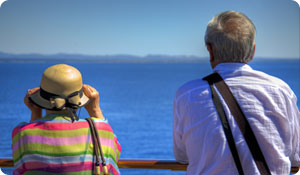
Travel advice for older adults is pretty much the same as for younger people, with a few extra tips about health and safety.
Your primary concern when traveling short or long distances is to stay safe and healthy. And the best way to make sure that happens is to plan ahead. If you are taking a trip overseas, gather travel and tour information designed specifically for older adults. The better prepared you are and the more you know about what to expect from the minute you land in a different state or a foreign country, the smoother your trip will be.
Before You Go
- Before your trip, visit your doctor for a medical clearance, especially if you have any chronic medical conditions. You may need to get specific vaccinations well in advance to travel in different countries.
- Make arrangements for special needs at airports, such as wheelchairs or special seating, in advance.
- Plan to use wheeled luggage.
- Pack enough medication, including non-prescription drugs such as aspirin and anti-diarrhea pills, to last the entire trip.
- Have a schedule in place if you will be taking your medications in different time zones.
- Be sure to get international medical insurance or emergency out-of-network coverage on your current policy if you are traveling anywhere out of the country.
- Make photocopies of your passport and any other identification or important papers and pack them in a separate, secure place from the originals.
- Don't pack any valuables in luggage you plan to check.
- Do pack a carry-on bag with enough necessities to cover delays and luggage loss.
- Consider purchasing travel insurance if there's a chance you may have to cancel or reschedule your trip.
While Traveling
- Never leave your luggage unattended.
- On long flights, stretch your limbs and get up and walk around to exercise your joints, if possible.
- Stay well-hydrated, but be sure your drinking water is safe and that ice cubes are made from potable water. If in doubt, stick with bottled and hot beverages.
- When traveling in countries where water cleanliness is in question, eat well-cooked food. At restaurants, avoid salads and other raw foods that may be rinsed in water before being served uncooked.
- Always walk in brightly lit areas. If you are traveling by car, use brightly lit, well-traveled roads.
- If you carry a purse, keep it close to your body and keep your hand on it. Even better, use an inner pocket inside your coat or a money belt under your clothes to carry your passport, other identification, credit cards, and cash.
- Don't pull out large sums of money at one time when paying for items in stores or restaurants.
- If you are on a tour, stick with your group and notify the guide and group members if you decide to change the routine.
- Wash your hands often and carry hand-sanitizing lotions or wipes.
- Travel and tour at a relaxed pace to avoid becoming overtired or sick.
Sources:
Baylor College of Medicine: Tips for Traveling with Older Adults Web Sept 2012
http://www.bcm.edu/news/item.cfm?newsID=2565
World Health Organization: Travel and Health
http://www.who.int/topics/travel/en/





